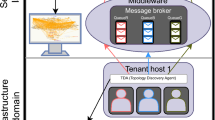Abstract
Arigatoni is a structured multi-layer overlay network providing various services with variable guarantees, and promoting an intermittent participation to the virtual organization where peers can appear, disappear and organize themselves dynamically. Arigatoni mainly concerns with how resources are declared and discovered in the overlay, allowing global computers to make a secure, PKI-based, use of global aggregated computational power, storage, information resources, etc. Arigatoni provides fully decentralized, asynchronous and scalable resource discovery, and provides mechanisms for dealing with dynamic virtual organizations. This paper introduces a non trivial improvement of the original resource discovery protocol by allowing to register and to ask for multiple instances. Simulations show that it is efficient and scalable.
This work is supported by Aeolus FP6-2004-IST-FET Proactive.
Preview
Unable to display preview. Download preview PDF.
Similar content being viewed by others
References
AEOLUS. Deliverable D2.1.1: Resource Discovery: State of the art survey and Algorithmic Solutions (2006), http://aeolus.ceid.upatras.gr
Banavar, G., Chandra, T., Mukherjee, B., Nagarajarao, J., Strom, R.E., Sturman, D.C.: An efficient multicast protocol for content-based publish-subscribe systems. In: Proc. of ICDCS (1999)
Benza, D., Cosnard, M., Liquori, L., Vesin, M.: Arigatoni: A Simple Programmable Overlay Network. In: Proc. of John Vincent Atanasoff International Symposium on Modern Computing, pp. 82–91. IEEE Computer Society Press, Los Alamitos (2006)
Carzaniga, A., Rosenblum, D.S., Wolf, A.L.: Design and Evaluation of a Wide-Area Event Notification Service. ACM TOCS 19(3) (2001)
Chand, R.: Large scale diffusion of information in Publish/Subscribe systems. PhD thesis, University of Nice-Sophia Antipolis and Institut Eurecom (2005)
Chand, R., Cosnard, M., Liquori, L.: Resource Discovery in the Arigatoni Overlay Network. In: I2CS: International Workshop on Innovative Internet Community Systems. LNCS, Springer, Heidelberg (to appear, 2006), Also available as RR INRIA 5928
Chand, R., Felber, P.: A scalable protocol for content-based routing in overlay networks. In: Proc. of NCA (2003)
Chand, R., Felber, P.: XNet: A Reliable Content-Based Publish/Subscribe System. In: SRDS 2004, 23rd Symposium on Reliable Distributed Systems (2004)
Cosnard, M., Liquori, L., Chand, R.: Virtual Organizations in Arigatoni. In: DCM: International Workshop on Developpment in Computational Models. Electr. Notes Theor. Comput. Sci. (to appear, 2006)
Eugster, P.T., Felber, P., Guerraoui, R., Kermarrec, A.M.: The many faces of publish/subscribe. Computing Survey 35(2), 114–131 (2003)
Freedman, M.J., Mazières, D.: Sloppy Hashing and Self-Organizing Clusters. In: Proc. of IPTPS, pp. 45–55 (2003)
Ganesan, P., Krishna, P., Garcia-Molina, H.: Canon in g major: Designing DHTS with Hierarchical Structure. In: Proc. of ICDCS (2004)
Globus Alliance: Globus Home Page, http://www.globus.org/
Heimbigner, D.: Adapting publish/subscribe middleware to achieve gnutella-like functionality. In: Proc. of SAC, pp. 176–181 (2001)
JXTA Community: JXTA Home Page, http://www.jxta.org/
Planet Lab Consortium: Planet Lab Home Page (2006), http://www.planet-lab.org/
The Grid 5000 Consortium: Grid 5000 Home Page (2006), http://www.grid5000.org/
Zegura, E.W., Calvert, K., Bhattacharjee, S.: How to Model an Internetwork. In: Proc. of INFOCOM (1996)
Author information
Authors and Affiliations
Editor information
Rights and permissions
Copyright information
© 2007 Springer Berlin Heidelberg
About this paper
Cite this paper
Chand, R., Liquori, L., Cosnard, M. (2007). Improving Resource Discovery in the Arigatoni Overlay Network. In: Lukowicz, P., Thiele, L., Tröster, G. (eds) Architecture of Computing Systems - ARCS 2007. ARCS 2007. Lecture Notes in Computer Science, vol 4415. Springer, Berlin, Heidelberg. https://doi.org/10.1007/978-3-540-71270-1_8
Download citation
DOI: https://doi.org/10.1007/978-3-540-71270-1_8
Publisher Name: Springer, Berlin, Heidelberg
Print ISBN: 978-3-540-71267-1
Online ISBN: 978-3-540-71270-1
eBook Packages: Computer ScienceComputer Science (R0)




